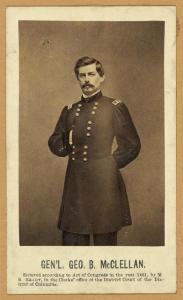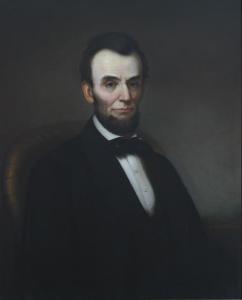Two years on a Democrat paper sure was not forgiving and forgetting President Lincoln’s sacking of George B. McClellan as commander of the Army of the Potomac. The paper also claimed that Mr. Lincoln would make decisions about General McClellan’s role based purely on politics.
From a Seneca County, New York newspaper in October 1864:
The Baseness of Assaults against McClellan.
It has been repeatedly charged that previous to the Chicago Convention, FRANCIS P. BLAIR, sen., father of Montgomery Blair, Mr. Lincoln’s Post Master General, had an interview with Gen. MCCLELLAN, on behalf of the President, during which he offered him an important command if he would refuse the Chicago nomination. This charge has never been denied by the Lincoln press, and even if it had, we now have the authority of Hon. MONTGOMERY BLAIR, Lincoln’s recent Post Master General, who admits the report. In his recent speech in New York, and published in the New York Tribune of Sept. 28th., Mr. Blair in referring to the action of the Chicago convention, says:
On his (Vallandigham’s) motion every voice that had been raised to fury against the nomination of McClellan was silenced, and the vote in his favor made unanimous. There was a potent spell in his voice that made “a cessation of hostilities,” “a Convention of the States,” of course as equals and independent – and a quoudam [quondam?] chief of the Federal army – (one whom to the last I believed to be true to the cause in which the country embarked, and I may add, whom the President held to be patriotic, and had concerted with General Grant to bring him again into the field as his adjunct, [pointing finger] if he turned his back on the proposals of the peace junto at Chicago, &c. [reverse pointing finger]
What a confession! Here we have the authority of a late Cabinet Minister, that Mr. Lincoln had arranged to give MCCLELLAN a high command, as Grant’s “adjunct,” “IF he turned his back” on the Chicago Convention. The President believed MCCLELLAN to be patriotic, and yet for selfish and political purposes, he is deposed from the army; the President believed him true to the last, but through a desire to promote his own partisan interests, he would heap every indignity upon a brave and accomplished soldier, divide and distract the people of the North, and thus destroy all hope of Union. For the same selfish and ambitious reasons the President would place him in command, or even do anything in his power to to be rid of him for an opposition candidate for the Presidency. Is it such a President that we are called upon to continue in power? And is such a President fit to govern – or fit to live?
150 years ago this month part of the Lincoln press did refute the assertion that General McCLellan was offered a command if he rejected Chicago. From The New-York Times October 10, 1864:
The President and Gen. McClellan.
The Copperhead press has been making a great deal of capital out of an alleged offer made by F.P. BLAIR, Esq., to Gen. McCLELLAN. It has said that Mr. BLAIR had told the General that the President would give him a command in the field, provided he would decline being a candidate for the Presidency at the Chicago Convention. It was assumed and charged that in doing this Mr. BLAIR had acted for the President, and that the latter was therefore responsible for the offer.
In another column we publish a letter from Mr. BLAIR on this subject. He states, in the first place, that Mr. LINCOLN not only did not authorize him to make any such proposition to Gen. MCCLELLAN, but that he did not know of his intention to see him on that or any other subject, or of his purpose to visit New-York at all. He says, in the next place, that he never made any such offer to Gen. MCCLELLAN, or anything which could be construed into an offer of a command in the field on that or any other condition. And, in the third place, he states what he did say to Gen. MCCLELLAN on that and other subjects. He advised him not to be a candidate for the Presidency, because he was certain to be defeated, and under such circumstances that he could never hope to rise again. He also advised him to apply to the President for a command in the field, because his military knowledge enabled him to be of service to the country in that capacity, and it was due to his friends, who believed he had talent, to evince a willingness to use it.
Now, in all this, we must say Mr. BLAIR showed his usual good sense. …
The Intelligencer is also striving to make a great deal out of a public statement said to have been made by Mr. MONTGOMERY BLAIR to the effect that the President had “concerted with Gen. GRANT to give Gen. MCCLELLAN a command if the latter would turn his back on the Chicago nomination.” We have no evidence that Mr. BLAIR ever made any such statement. If he did, he made it without authority, for it certainly is not true. President LINCOLN did once ask Gen. GRANT whether Gen. MCCLELLAN would be acceptable to him and useful to the country as commander of a corps in the army of the Potomac; but he never said or intimated to Gen. GRANT or any body else, nor did he ever think of giving him such a command or of offering it to him on condition of his turning his back on a Presidential nomination. Whatever “conditions,” if any, were suggested or thought of in this connection were of a purely military character, and related solely and exclusively to the General’s probable usefulness in the field.
On September 28th the Times published a report on Montgomery Blair’s speech at Cooper Union. Mr. Blair criticized General McClellan throughout his talk, but he was reported by the Times as saying exactly what the Democrat paper reported.


